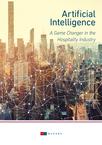
The Four Pillars of AI Transformation in the Hospitality Industry
Based on our own involvement and research of the industry** we have articulated what such transformation looks like in the form of four pillars.
#1: Agility
With the speed of technological change increasing, the agility of businesses to adapt will be key. The experience and expectation of AI by travellers is complex and not only influenced by economic status, but also by nationality, culture and age. Therefore, it is important that the industry has the strategic agility to react and to predict different traveller needs and perspectives to successfully implement a strategy underpinned by AI.
#2: Integration
As AI and the Internet of Things (IoT) have a greater impact on how business is conducted, the effect on internal processes and the wider supply chain will be as important as the impact they have on the guest experience. For instance, a voiced controlled customer service can be used to allow guests to order room service, to control lighting or temperature in the room. Both sides of this equation have to be in sync in order to be effective. Ensuring there is an integrated and unified approach to any AI-led strategy will therefore be critical.
#3 Security
As we move to a more data sensitive era, security and transparency will become more importantto travellers. Who stores their data and for what purpose will need careful management. Operational transparency and a strong process driven approach will be key elements to building the necessary levels of security and trust.
#4 Sustainability
The expectation that AI can help the industry become more sustainable through its capacity to manage precious resources and reduce disruption to local cultures is growing. Here, the ability to use AI as a force for good needs to be brought to the attention of travellers. Not only to highlight the industry’s achievements so far, but also to emphasise future plans the hospitality industry has to promote sustainability.
While it is certain that AI will force the industry to reinvent certain aspects of its approach, there are also some exceptional opportunities to benefit from AI. Particularly since current estimates predict that international tourist arrivals will reach 1.8 billion by 2030*, and lucrative new and emerging travel markets in China and Asia set to maintain healthy industry growth. By identifying the four pillars the industry needs to transform, and having ongoing dialogues with clients, Mazars can offer the range of support companies need. Going forward, a greater understanding of the issues, collaborations and partnerships that are transforming the hospitality industry will be increasingly important tactics to stay ahead of what is an ever-changing game.
*https://www.e-unwto.org/doi/pdf/10.18111/9789284419029
**To learn more, please download our Mazars 2018 Global study on AI in the hospitality industry “Artificial Intelligence: A Game Changer in the Hospitality Industry”
ANTON LISSORGUES



